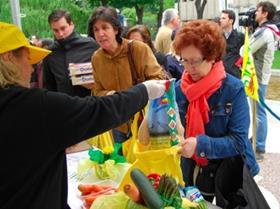
Spain’s fruit and vegetable exporters, led by national federation Fepex, have called on the European Commission to set up an emergency compensation fund for growers hit by the E.coli crisis, with a view to covering 100 per cent of the damages caused.
With an emergency council of EU agriculture ministers meeting today (7 June) in Luxembourg to discuss the situation, Fepex has urged the approval of compensation funds to aid stricken Spanish growers affected by a near-collapse in prices.
Despite Spanish cucumbers have been cleared by the European authorities of any link with the E.coli outbreak in Germany, sales of all Spanish fruits and vegetables have dropped dramatically across Europe.
According to Fepex, losses suffered by Spain’s fresh produce sector are still increasing and the situation in export markets is becoming “ever more serious” due to the continuing uncertainty, on the part of the German authorities, as to the source of the outbreak.
For this reason, the organisation said it critical that ministers “approve extraordinary measures directed at all affected producers, with the aim of compensating for 100 per cent of damages suffered by the sector”.
However, commenting yesterday on today’s meeting, the European Commission said that while it was seeking to compensate all EU producers, its crisis management programme for producer organisations was capped at 5 per cent of the annual turnover of each group.
It said state aid, of between €7,000 and €8,000 per farmer, was also possible, although it added that this could only be allotted once every three years.
In an illustration of how the ‘cucumber crisis’ has come to effect all sections of the Spanish fresh produce sector, Valencian association Ava-Asaja reported today that prices for fruits and vegetables had dropped by between 30 and 100 per cent in just 15 days.
The group said that prices had fallen for a wide range of products, including aubergines by 40 per cent, potatoes by 68 per cent, cherries by 75 per cent and apricots by 50 per cent.
Where prices had dropped to an unsustainable level, Ava-Asaja said the goods would either be destroyed or used for animal feed, or donated to local charities.
“The (Spanish) fresh produce sector is extremely concerned because activity in markets is still below minimum levels, demand has not improved and prices at source have not ceased to fall,” said Ava-Asaja president Cristóbal Aguado.
In support of growers, the Coordinator of Agricultural Organisations (COAG) said it would be handing out 4,000 tonnes of free fruits and vegetables in Madrid’s Paso de Recoletos tomorrow (8 June), at an event to be attended by celebrities and sporting stars.



